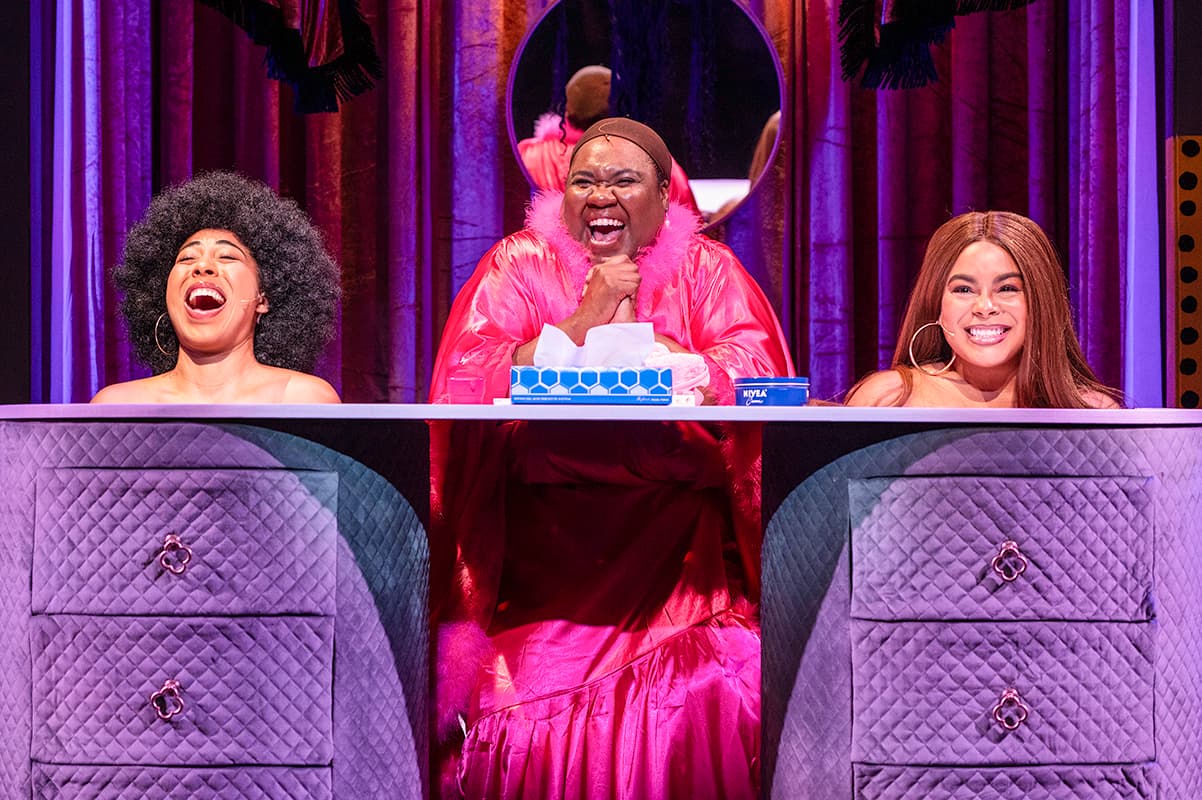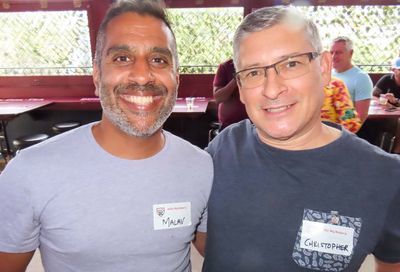‘Radio Golf’ Review: The Price of Success
The late August Wilson's "Radio Golf" closed out his celebrated Century Cycle with a stark, urgent drama set in 1997.

In Radio Golf, the last of his ten-play Pittsburgh (or Century) Cycle, August Wilson offered another powerful take on the contemporary Black lived experience. If the play, written just months before he died, feels less tight and textured than earlier works, its reedier tempo nevertheless culminates in a stark and urgent note that wholly befits the Cycle.
Wilson wrote Radio Golf (★★★☆☆) in 2005, having witnessed how decades of activism were slowly beginning to offer Black Americans opportunities to join the white establishment and reap the rewards. As is his signature, Wilson is in it for the complications: his characters grapple with whether the price of entry is too high and whether — and how much — they owe each other and their shared history.
Ever authentic, no matter how uncomfortable, Wilson explores what transition means for Black identities, whatever the potential rewards.
Like many in the cycle, the play is set in Pittsburgh’s historically Black and underserved Hill District. The year is now 1997 and the drama unfolds in the office of realtor and aspiring mayor Harmond Wilks.
Wilks has partnered with his old school friend, and now-banker, Roosevelt Hicks to redevelop a nearby neighborhood they consider blighted, proposing to replace the old houses with a complex of apartments and chain stores.

Joined by Wilks’ PR-expert wife, Mame, the trio seem poised to boost, not just the locale, but their respective careers. The wrench in the works arrives with Elder Joseph Barlow, an old man who comes looking for a lawyer and proceeds to chat away at Wilks with a mix of riddles, wisdom, and a fair dose of melancholy.
Eventually we learn that Barlow’s house — situated right in the middle of the development site — was never properly acquired and he has no intention of selling. As demolition day approaches, the pressure mounts on Wilks to walk a line between past and future — and what it all means to his sense of self.
The late-nineties city mood is nicely evoked in Round House’s production by scenic designer Meghan Raham’s simple rental office, offering an antique tin ceiling and retro colors suggesting the many lives and epochs the walls have seen. The beautifully rendered impressionist urban scape beyond the windows is particularly evocative of life in a city’s backwaters (even if the ground looks rather more like snow than scrub).
The play is all about intersections between past and present, economic potentials and the brick-and-mortar evidence of history, and this gets it right.
But the challenge of Radio Golf — and there is one — is that, in building to his denouement, Wilson spends a not insignificant amount of time unfolding the backstory of Barlow’s property and Wilk’s mayoral strategies which, while informative of life’s complexities, in some ways hampers the evolution of the emotional and relational currency of the play.
We learn all kinds of schematics about the characters (Wilks went to Cornell and his brother died in Vietnam), the deal (Starbucks, Whole Foods, and a radio station are involved), and the problematic house (there are back taxes and a missed auction), but with all of this to cover, there fewer moments to stop and breathe.

Those that do come are through director Reginald L. Douglas’ careful pacing and the space created for Barlow, played brilliantly and with relish by Craig Wallace. With pitch-perfect timing, Wallace surfaces every piece of Wilson’s witty and wistful poetry, knowing exactly when to pause and let a powerful thought or word hang in the air — and exactly how to spin out the comic timing. Indeed, every moment he’s on stage is nothing short of a gift.
Another lifesaver here is Ro Boddie’s Roosevelt, who enters every scene like a shot in the arm. Roosevelt may not have the moral high ground, but Boddie delivers him with the kind of verve, charm, and humor that shines a light on just how complicated life can get.
He also does a stellar job of keeping the emotional momentum going so that by the time Wilson asks if Roosevelt is compromising himself by being the “Black face” for a white man’s business deal, or if he is still winning just by virtue of the power that money will bring — we see not just what’s at stake but what drives him.
Another strength here is Kevin Mambo as Sterling Johnson, a local handyman who reveals himself to be passionately political and ready, able and willing to voice some of Wilson’s most searing comments on Black identity.
Mambo truly owns this role, capturing all its facets: affable guy from the neighborhood, a hustler with an honor code, and yet also a man who is deeply scarred and angry from a lifetime of racism, casual and otherwise.
Trickier is JaBen Early’s Wilks. Early has tremendous presence and feels authentic to this almost-morally-compromised man, but he never quite projects enough in his expressions or voice. If he would be ideal for a filmed version of the play with its concomitant close-ups and need for understatement, here, he is at times hard to hear and his most demonstrative moments feel energetic but somewhat under-actualized.
The chemistry with Mame also comes across as a little forced and their embraces slightly over-choreographed. As Mame, Renee Elizabeth Wilson never quite sings with the role, although she does nicely capture Wilson’s nod to strong women, calling out Wilks for not realizing that she has her own goals and “questions” about life. Wilson’s treatment of Mame is one of the causalities of his focus on such a detail-oriented plot — there just isn’t the space to get more than a sketch of Mame and her place in this emerging world.
Despite these few shortcomings, Round House’s production remains a rare opportunity to see the last installment in Wilson’s Cycle performed with energy and commitment to his final questions and concerns. And if this may not be Wilson’s greatest work, it still provides an authentic and often wryly amusing portrait of the myriad of choices — little and large — foisted on Black Americans every day as a result of the legacy of slavery and ensuing racism.
As always with Wilson’s plays, it is a privilege to be invited in long enough to learn, witness and wonder at the experiences many of us can hardly begin to fathom.
Radio Golf runs through July 2 at the Round House Theater, 4545 East-West Highway in Bethesda, Md. Tickets are $46 to $86. Call 240-644-1100 or visit www.roundhousetheatre.org.
Support Metro Weekly’s Journalism
These are challenging times for news organizations. And yet it’s crucial we stay active and provide vital resources and information to both our local readers and the world. So won’t you please take a moment and consider supporting Metro Weekly with a membership? For as little as $5 a month, you can help ensure Metro Weekly magazine and MetroWeekly.com remain free, viable resources as we provide the best, most diverse, culturally-resonant LGBTQ coverage in both the D.C. region and around the world. Memberships come with exclusive perks and discounts, your own personal digital delivery of each week’s magazine (and an archive), access to our Member's Lounge when it launches this fall, and exclusive members-only items like Metro Weekly Membership Mugs and Tote Bags! Check out all our membership levels here and please join us today!



























You must be logged in to post a comment.